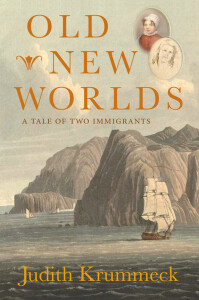
Subtitled A Tale of Two Immigrants, this book is both a memoir and an historical reimagining. In February of 1815 Sarah Barker, formerly a servant, and her new husband George, a missionary, set sail from Portsmouth, England bound for South Africa.
Whatever we may think of missionaries and colonialism today, it was an extraordinarily courageous thing to do. It is a brave thing to embark on a marriage—how much more so when it means leaving behind your country and culture; knowing that you will rarely, if ever, be able to return for a visit; unsure of what you will find when you arrive.
Two hundred years later, Sarah’s great-great granddaughter, writer and broadcaster Judith Krummeck, newly married, left South Africa for the United States. (Full disclosure: Krummeck and her husband are friends of mine.)
With a gentle but assured touch, Krummeck explores that transition, showing this country from an outsider’s point of view. She looks at the nuances of belonging, of creating a home in a new place. Unlike Sarah, her experience is complicated by the possibility of return, for visits or perhaps even permanently.
Much of the memoir portion also invites us into her process of learning about her great-great grandmother, not just burying herself in library reading rooms, but figuring out how to walk the tightrope between being true to the time period and the urge to impose today’s values on the actions of her imagined great-great grandparents. To her relief, the records show that George Barker did in fact treat his parishioners with respect and tried to protect them from the colonial administration.
The book is well-researched, drawing on Barker’s letters and journals as well as other sources. An extensive bibliography is provided. For all that, Sarah’s life, her thoughts and feelings are undocumented. Krummeck explains that Sarah is almost never mentioned in George’s writings, so she has had to use her imagination to fill in the gaps.
Of course it is no surprise that so little is known about Sarah. At that time, the lives of ordinary women were not considered worth documenting. Indeed, it is only recently that historians have begun concerning themselves with ordinary life, much less the lives of women.
For Sarah’s story alone I love this book, as I love any that fill in that empty space in the shape of a woman. Entwining it with Krummeck’s physical and emotional adjustment to America adds depth and resonance to the themes explored here.
As the pandemic spread and stayed, most of us have had to rethink our ideas of home. We look at our once adequate spaces with new eyes, trying to gauge where work can be done, children can be schooled, perhaps even an infected family member isolated. I remember how, as a child in a large family, I was constantly seeking out spaces to be private. Confined to the house, many people are experiencing that now.
So it is a good time to consider what it means to be at home: the place where we are born and the one we choose, the house we create and the family we construct, the country we call home and the landscapes we inhabit. This delightful book reminds us of what we inherit and what we make for ourselves.
What does home mean to you?
